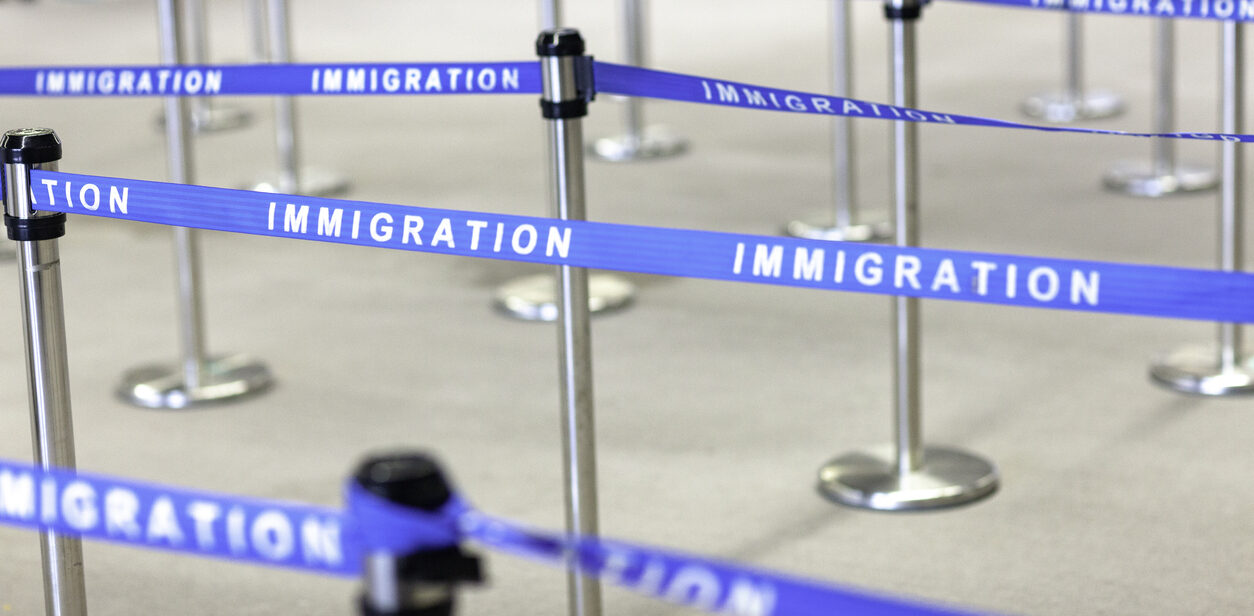
Welcome to the Academics Corner! CPJ’s ongoing series sharing the good work that Christian academics are doing to promote public justice from their research to the lecture hall.
RS: Could you tell us about how you first got involved with the Center for Public Justice?
RMH: I was on the American Studies Program [in Washington D.C.] and then worked for the Council for Christian Colleges and Universities for a while. That’s when Jim [Skillen] had what was then the Association for Public Justice (APJ). And they were right next door, so we had some good interactions. Then, as I went off to pursue my doctorate, the Civitas program was beginning, and Jim was able to pull me into that which was a fantastic exposure. So I did that in 1999, and then I did a Brookings Fellowship through CPJ and Civitas in 1999.
After I finished graduate school and got my position at Gordon in 2006, Jim said that he thought I should write something on immigration. I had been doing more work in Latin American development and U.S. Foreign policy towards Latin America at the time. These were things of interest that I cared about; I come from an immigrant family, and I grew up in California. So Jim encouraged me to get involved in writing about immigration and so I have him to thank for that.
RS: How have you found ways to utilize CPJ’s resources in your undergraduate classes?
RMH: We’ve got an introductory class entitled Power and Justice: Perspectives on Political Order and so we do a lot on pluralism in that class. So I’ve used some of CPJ’s resources there. I’ve also used some of the Capital Commentary pieces in my Women in Politics class and Politics in the Developing World class. Being on the board now, that’s a great new way I’m getting exposed once again to the wonderful things that CPJ is doing. And we’ve had so many students intern with you all, so that I feel like it’s going to open up more opportunities for connections.
RS: What are your current research interests? And what are you writing about right now?
RMH: I’m currently working with World Relief on faith and immigration research. I’m the lead research consultant on a grant project. We are working in five cities in which World Relief is doing work with evangelical congregations, with refugee resettlement, and ESL programming and all sorts of things to support immigrants and refugees. They wanted us to come alongside and to try to understand how folks in those congregations who are worshiping with immigrants and working with immigrants side by side, volunteering, and so on how that shapes perspectives. That’s some of the research I’ve been doing for a long time — to understand perspectives on immigration amongst Christian conservatives and what shapes those perspectives.
In these five cities we’ve undertaken focus groups with people who are engaged in some of that work. And now we’re doing surveys amongst those congregations, and then also amongst congregations not doing anything related to immigration but where the leadership may have some interest in doing so in the future. So, we’ll have a nice control group and comparisons to see what difference it makes as people are side by side, worshiping and growing with immigrants, or engaged in volunteering, whether that’s ESL or legal clinics, or transportation, or refugee resettlement.
RS: As someone who has researched and studied Christian perspectives on immigration, how has your Christian faith informed your desire to study immigration policies?
RMH: My family immigrated here for different reasons and that stimulated my thinking but I hadn’t really thought about it much in terms of my faith until I was in college. I was in college during the Central American conflicts and we had, in Southern California in particular, a number of folks who were fleeing those conflicts that the U.S. was so involved in.
I was volunteering in a church in East Los Angeles helping teach ESL and trying to understand the push factors that brought migrants to the United States, and thinking about how the U.S. should be involved and how Christians should respond. That was the first time I started thinking about it more so in terms of my faith. And what kind of response the church ought to have, maybe what kind of response our government ought to have. Initially, I had a faulty presumption that most Christians thought the same way as I did on these questions. So, I wanted to understand why Christians come to different positions on this.
A lot of folks are coming due to war and deprivation and crisis.
RS: Immigration is currently a pretty “hot” if not controversial topic. Many have described the situation at the border as a “crisis.” What are some solutions to the immigration “crisis” happening at the border that address the underlying causes of immigration? What might some of those public policies look like?
RMH: I think, just in terms of push factors, a lot of folks are coming due to war and deprivation and crisis. So there are questions around U.S. foreign policy in terms of support for those nations or development efforts or policies in the past that may have contributed to some of these push factors. And that doesn’t mean that the U.S. is entirely responsible for the predicament of all these current governments and the situation in which people are living, but it is linked. I do think ignoring push factors and only dealing with the border crisis itself is problematic. Some of the best efforts at immigration reform recognize that those things need to be done and considered in tandem.
As for the border issues it does look like some of the numbers and apprehensions at the border have decreased in the last month as opposed to in January. It looks like some of that is in part because of the increased cooperation with Latin American allies and having more of the processing occur, in countries of origin, or with some of our allies, so that people aren’t making the treacherous route before they have an assurance of the capacity to arrive and be welcomed here. So I think that is a helpful strategy.
It’s certainly not a perfect one but it is a helpful one given the dangers that people face on that treacherous route to come here. I don’t think the CBP One app is perfect but it does seem like channeling people through ports of entry and through legal means is preferable to not giving them those options. So, in addition to more legal paths to entry and improving the process, having more appropriate and humane border enforcement is helpful as well.
Immigrants tend to fill the upper and lower tiers of the economic sector in places where the needs for labor tend to be higher.
RS: Many people who are against immigration are worried that if the U.S. allows more people to enter the country, it would negatively impact the job market and wages. Is there any evidence that those fears could come true? Will immigrants have an impact on job competition and wages that negatively affect certain groups? If so, what should Christians do? If not, how should Christians respond when they hear this reason for closing the borders?
RMH: I do think there are legitimate concerns, and that some people feel the pain of this more than others. However, I think we all gain as a nation. Typically, when you look at economic effects of migration nationally, coffers are fuller and economies tend to grow, but there are localities that might feel more pain associated with a concentration of migration. And massive demographic shifts may have implications for job competition and wage depression, but nationally, the gains are pretty significant.
And there are economists who would say overall, the gains are greater than the cost. But again, that’s not to say that some people don’t feel this, and I think the people who are most at-risk tend to be people without a high school education. So the question is: Is the solution to not allow migration? Or is the solution maybe to provide more and help folks who have missed out on education to be better educated and to be more competitive?
I don’t see it as much of a zero sum game within the U.S. in particular. In some countries this may be a bigger issue, but I don’t see it in the U.S. given some of the demographic challenges that we are facing. Immigrants tend to fill the upper and lower tiers of the economic sector in places where the needs for labor tend to be higher. And I think, even in the survey data, you see that Americans, as opposed to many Europeans, have a more positive view of immigrants, documented or not, because, being hard workers, they are willing to take on jobs that often native born Americans are not willing to take on. I think the data shows there’s more job creation made by immigrants than job displacement.
RS: In order for people to be able to flourish in their new country, there may need to be some awareness and literacy of the culture and language there. As Christians who value the diversity and pluriformity of cultures around the world, what obligations, if any, are there for those in the Church to provide access to a culture that is new to immigrants as well as a respect for the culture immigrants bring with them? In fewer words, is there an obligation to teach immigrants about the culture they are entering? And if so, how do we do that?
RMH: I do think this is one area in which religious institutions have done a fairly good job in terms of refugee resettlement and welcome, the work of settlement houses historically, the teaching of ESL and other ways in which they have helped welcome and integrate newcomers to this country.
I also think there’s a responsibility on newcomers not only to share the culture from which they come, but also to learn about the new culture that they’re becoming a part of. So I think migrants have rights, but they also have some responsibilities, and I think that churches could play a good role in honoring what they bring while also helping support them. Linguistic capacity, for example, is so crucial for education and workplace capacity and so on.
I think some congregations have been great about also providing space for folks to be able to worship in their heart language via ethnic worship services and other congregations inviting newcomers to join them in their combined worship services.
RS: The Center for Public Justice’s guidelines on government states that the government has the obligation to care for its own citizens. How does the obligation of a state to care for its own citizens relate to the obligation of government to be equally concerned with the welfare of non-citizens who would benefit from immigration?
RMH: I think that we should be thinking about justice in global terms and national terms and local terms. So I think it’s fair for us to think about our obligations to our neighbors and to our allies — to consider our obligations to countries with which we’ve had maybe more of a neocolonial role. But there are, of course, obligations to one’s own citizens, and a responsibility to ensure that their needs are also being met.
It was very helpful to have hosted a panel on immigration in the workforce in 2010 with CPJ. Some of the voices that were very critical and concerned about migrants were folks coming from marginalized communities in the US that were worried that their own concerns and their needs were being left behind as newcomers came and replaced them in the workforce. So I want to be sure that [foreign] governments and our own are considering those things simultaneously. And so governments should think about just, orderly, and decent migration policies with viable limits.
I looked at some of these questions in Denmark when I was there [on a research trip] trying to understand how they’re looking at this in their country of 6 million. The US is a very big country so it’s quite different but it’s good to question how many migrants a country of that size can viably welcome and retain its own culture. How much of its resources should it put towards welcoming newcomers, and how much should it put towards supporting the countries from which people are coming so that their pressure to migrate is not as great? And how much should a country spend on supporting the needs of the marginalized already there? I think those are reasonable and very good concerns.
EC: What would you say to the person who is so disenchanted with partisan immigration talking points that they don’t want to engage with the issue? Why should they, as a Christian, care about this?
RMH: The issue of migration is affecting everybody and it doesn’t look like it’s going to decline. Given the nature of an increasingly multipolar world with increased conflict and increased displacement. Climate migrants also look like they’re going to be on the rise. So I think that the reasons for migration are only growing, not the opposite. I don’t think we should be burying our heads in the sand. I think we need to be paying attention and thinking about how to deal with it well.
I also think it’s something that you can harness [for economic development that benefits all in the long run]. There are think tanks like the Center for Global Development who are big on migration — seeing it as one of the best ways to support development. Remittances are huge. They argue, why shouldn’t people be able to go where the jobs are? And why shouldn’t those who need employees be able to hire them? I’m not advocating for open borders, but there are many economic analysts who are far more supportive of much freer labor mobility just as a logic for meeting needs.
There are a lot of migrants in the US who are caught in the middle and are waiting for years to have legal status that are just living in limbo. They’re humans. They’re made in the image of God and that matters. I think it’s urgent that our country come up with a just and humane way of resolving these cases, such that those who remain in this country are here legally so that they can have status. We want people to feel welcome. We want them to be able to cooperate and not have to live in the shadows. We want them to be able to be full-fledged members of this community. I think it’s unjust and problematic for people to have to live in the shadows being vulnerable and at risk when they are contributing to our economy.
I would encourage them to visit or attend multi-ethnic churches and immigrant churches and have that experience and worship alongside immigrants.
EC: For the person who’s already recognized that this is important. What are some practical ways that they can get involved?
RMH: There’s a lot they can do in terms of research and reading to prepare themselves and better understand the issue and why it has been so difficult for us to come to agreement on this in terms of our legislature and to create just and reasonable laws.
I would encourage them to visit or attend multi-ethnic churches and immigrant churches and have that experience and worship alongside immigrants. I would encourage them to volunteer and teach ESL. There are also training sessions that students can even start engaging in. World Relief has this basic immigration law training that people can do to try to help provide some legal assistance for those who are seeking documentation and legal status. I’ve also had a number of students who have found summer programs where they could do work with refugees in the summer — like with ELIC. There are so many refugee camps globally and organizations that people could be working with to help some of those folks, giving them the tools to succeed in life and giving them some hope and encouragement.
EC: For the students who like to read, what are your book recommendations?
RMH: Historian Aristide Zolberg has written a helpful book called A Nation by Design: Immigration Policy in the Fashioning of America. Matt Soerens and Jenny Yang also have a book, Welcoming the Stranger, written from a Christian perspective. Giovanni Perri, George Borjas, Michael Clemens and Robert Fairlie have all done great economic research that people can look into. There is also Ulrike Stockhausen’s The Strangers in our Midst: American Evangelicals and Immigration from the Cold War to the Twenty-First Century. And there’s my book with Lyman Kellstedt, Evangelicals and Immigration: Fault Lines Among the Faithful. Helpful websites with immigration resources include those of the Evangelical Immigration Table, Migration Policy Institute, the Pew Research Center, the Council on Foreign Relations and the Brookings Institution.
I started interviewing a lot of evangelical Christian leaders who were much more onboard with welcoming newcomers and with the Evangelical Immigration Table’s parameters for policy. Yet, survey after survey of evangelical laity showed they were not onboard.
EC: Is there anything that we should have asked you, or that you would like to talk about with us?
RMH: I also wanted to highlight something from Lyman Kellstedt and I’s book. When I started looking at this issue, I started interviewing a lot of evangelical Christian leaders who were much more onboard with welcoming newcomers and with the Evangelical Immigration Table’s parameters for policy. Yet, survey after survey of evangelical laity showed they were not onboard. In our book, Lyman and I try to explain some of that divergence. But I would also highlight an area where we found relatively more consensus across evangelical leadership and laity, namely resettlement assistance to refugees, especially for those fleeing particularly severe persecution or disaster. Just look at the history of the church on this in the U.S.; one area where the church has been more on the front lines of the work is refugee resettlement.
Not that there hasn’t been cultural concern or pushback. There are some congregations that are more isolationist, coming out of Christian nationalism. But I haven’t seen a denomination that has issued an overtly anti-immigrant statement. Most of them have been willing to sign on to at least an EIT statement regarding the need for immigration reform all together. I think most churches, as they think about the Great Commission, see that migrants, many of whom are genuine refugees, are coming here and they want to demonstrate the love of Christ and share the gospel. They don’t want to say something that creates an obstacle for missions; they want to be welcoming.
Ruth Melkonian-Hoover is a professor in the Political Science Department at Gordon College. Her scholarly interests include Latin America, immigration, women and politics, and religion and international affairs. She started serving on the Center for Public Justice’s Board of Trustees in 2024.
Emily Fromke Crouch is the Program Director for Shared Justice, CPJ’s program for Christian college students and young adults that works to inspire and equip the next generation of leaders with the framework and tools needed for a sustained commitment to civic engagement and advocacy in their communities. Before joining CPJ she worked on Capitol Hill for four different U.S. senators. She is a graduate of Wheaton College (IL) and an alumna of the Falls Church Fellowship Program.
Robert Strezo is a senior at Wheaton College studying Political Science with interests in philosophy and theology. He is a Spring 2024 intern for the Center for Public Justice.






